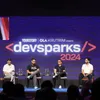Web3 experts debate the future of public vs private blockchains at DevSparks 2024
At a panel discussion during DevSparks 2024 in Bengaluru, Web3 experts came together to discuss how enterprises, developers and other tech builders can start building Decentralised Apps (DApps) on chain.
At a panel discussion during DevSparks 2024 in Bengaluru, Web3 experts came together to discuss how enterprises, developers and other tech builders can start building Decentralised Apps (DApps) on chain.
The panel, moderated by Sharat Chandra, Co-founder, India Blockchain Forum, comprised Kamakshi Arjun, BD Lead, India - Enterprise and Institutional Partners, Ava Labs; Alok Gupta, Founder and CEO, ChainCode, and Prashant Maurya, Co-founder and CEO, Network.
Setting the context for the session, Chandra explained that in a world where technology is fast becoming democratised, tech adoption is as much about storytelling and narrative as it is about infrastructure building.
Therefore, he asked, what are the narratives that need to be built to educate builders about Web3, and keep businesses well-informed on the technical aspects of migrating to Web3?
Arjun responded, "The narrative around decentralised app building is moving from private chain tech, such as Hyperledger Fabric, to public chains, such as Avalanche. This is because even private transactions, where it is critical to keep data private, can now be verified and settled on public chains, while keeping them private and secure."
"Validators on a public chain can verify the transaction, and this can happen on a private subnet inside a public chain. Data remains private, but transactions are verified by a more decentralised group of validators, who also verify other transactions on the chain and are not limited to a single use case," she explained.
Gupta suggested that developers should focus more on app development than worrying about what type of chain to use, adding that it all depends on the use case.
"A sandbox approach works well, where developers can only focus on building the use case, and the folks running the sandbox can provide plug-and-play blockchain solutions that best suit the use case being built," he said.
The panel also discussed the role of the underlying infrastructure powering blockchains, highlighting that a 'decentralised' blockchain may not be all that decentralised in the true sense if all its computing is on a centralised server.
"People take chains live on centralised cloud providers. This means the chain is centralised. The real need for decentralised infrastructure lies here, which means, we need resources like computing, storage, GPUs etc available as decentralised, modular components for developers to build a full-stack DApp on top of. By decentralising access to infrastructure as well, more access can be enabled," said Maurya.

Edited by Kanishk Singh




